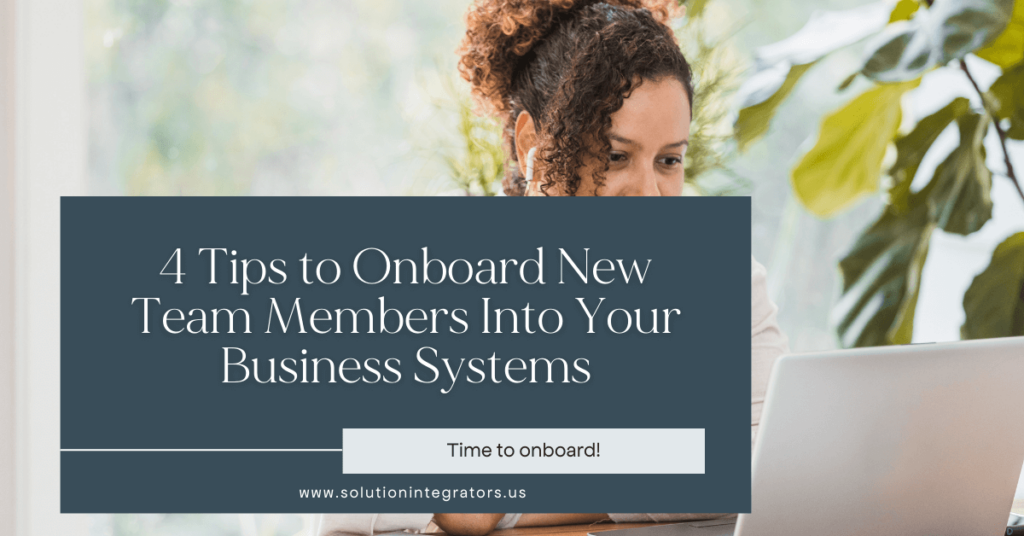Exceed your launch goals, deliver projects faster, and take on more clients - without touching a single tool
See what's possible with this FREE interactive walkthrough.
Choose Your Adventure
Browse by Category
Search the blog & press enter
I'm your Chief Systems Officer. I take your complex problems, and find ways to simplify them. With both a background in Project Management and Business Analysis, I'm able to identify processes in your business that are either slowing you down, or negatively impacting your client's journey and experience with you.
Hi I’m Ashley!

Hiring new team members is so exciting! It means you’re expanding your business and need help with the work you no longer have time for. But now that you’ve hired someone, what’s next? It’s time to onboard new team members into your business systems.
It’s your job to set them up for success. The onboarding process is critical to helping them adjust to their new role. Luckily, there are parts of onboarding you can do once and use over and over again.
I’ve used this process to onboard new team members and can confirm it makes life much easier. I’m going to share a few simple things you can do to make onboarding effortless for you and your new team member.
Provide SOPs
Standard Operating Procedures (SOPs) are documents that explain the steps to complete a repetitive task. Here are some examples of tasks you can make into SOPs:
- Replying to a client
- Booking meetings
- Writing and posting content (social media, blogs, emails, etc.)
- Doing competitive research
And these are just examples. The possibilities depend on your business needs. The point of SOPs is to get everyone on the same page regarding how to do things for your business. There are many reasons why you want to have SOPs on hand:
- If someone leaves your team, someone else can effortlessly take over their tasks.
- You don’t have to explain how to do something over and over again.
- You can analyze how your team accomplishes tasks to find room for improvement and increase efficiency.
SOPs result in a more productive team. When you onboard new team members, create a folder of SOPs relevant to the tasks they will be doing. This allows them to learn independently and take ownership quickly. It also reduces the chance of mistakes when they’re working in your systems.

Make Training Videos
Create training videos that cover general onboarding topics and role-specific skills. It’s easier for a new hire to follow the steps in a training video. They can also refer to it the first few times they complete the task if needed. Creating one video is much easier for you than repeating the steps until the team member learns.
By making videos, you can ensure new team members are familiar with your technology and systems. You can use training videos your system provides or your own. I recommend both. Sometimes training videos from systems are good overviews, but they aren’t specific to your business. Using both in your training plan will help the team members grasp the way to use your systems more easily.
Training videos can be part of your SOPs! Simply link the videos within the document.
Set Permissions
Consider the permissions you want to allow your new team member to have. I usually don’t give full privileges to my team members. Depending on the software, I don’t want them to see everything, or they don’t need to see certain information.
Setting permissions in your systems protects confidential client information. You don’t want to be put in a situation where you have a disgruntled ex-employee who shares or steals confidential information. Only give them access to things they need to complete their job.
Another reason to set permissions is to keep your new hire focused. I don’t know about you, but my systems can be pretty overwhelming to a new pair of eyes! I only give them access to the things they need so they don’t get lost or confused in my systems. If I need to expand their permissions later on, I can do that, too.

Have Clear Policies
In regards to your systems, establish clear policies and rules with your new hires. Your permission settings should help with this, too, but remember to set expectations with your new hires as to what they can and cannot do within your systems. Here are a few examples:
- Contractors can only communicate with clients through your task management system.
- Only add an email to your email management system when the email has been approved.
- Always check calendar availability within Dubsado before scheduling meetings.
Policies set expectations and boundaries to reduce the chance of mistakes. Make everything clear right off the bat so your new hire knows how to do their job effectively.
Hiring new team members is an exciting time in your business. I hope they help you grow your business even more! By creating an effective onboarding process for your systems, you can ensure your team members are set up for success. If you’re looking to streamline your hiring process, save time, and ensure your new team members feel right at home from day one, you need my new hire checklist. Take the guesswork out of onboarding and download today!
About Solution Integrators
To keep it simple, I’m Ashley, a Chief Systems Officer. I take your complex problems and find ways to simplify them. My goal isn’t just to save you time (saving you time is the easy part!) – I want to fully level up the way you interact, manage, and fulfill offers for your clients. I want to help you provide a cohesive experience. An experience that not only feels like quality but looks that way, too. From onboarding to offboarding – I want to transform each phase of interaction from lead to signed client. Let’s work together!
Related
Site Credits
Privacy Policy
Terms and Conditions
© solution integrators 2025
Get actionable biz systems insights, templates, and strategies delivered weekly - designed for service providers who want to streamline, scale, and stress less.
the goods newsletter
Helping motivated industry experts who want to achieve their next revenue milestone with simple systems, a supportive team, and a seamless client experience.